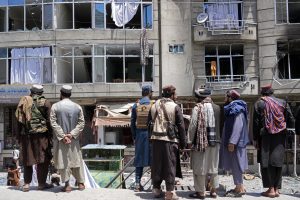Early on June 18, heavily-armed militants targeted a gurdwara, a Sikh place of worship, in the Afghan capital Kabul. Several blasts tore through the Gurdwara Karte Parwan in Kabul’s Bagh-e Bala neighborhood before militants opened fire and hurled grenades at the site. At least two people were killed and another seven injured in the attack.
The Islamic State Khorasan Province (ISKP), an Afghan affiliate of the Islamic State group, claimed responsibility for the attack on the gurdwara.
Describing the attack as “an act of support for the Messenger of Allah,” the ISKP said in a message posted on its Amaq propaganda site that the attack targeted Hindus and Sikhs and the “apostates” who protected them. One of its fighters “penetrated a temple for Hindu and Sikh polytheists” in Kabul, after killing the guard, and opened fire on the worshippers there with his machine gun and hand grenades, it said.
The ISKP said that the attack was in retaliation for derogatory remarks made against the Prophet Mohammed. It was referring to comments against Islam and the Prophet made by Nupur Sharma, the now-suspended spokesperson of India’s ruling Hindu nationalist Bharatiya Janata Party (BJP), at a live television debate in India on May 26.
Sharma’s remarks have evoked a strong response from Muslims in India and abroad. Governments from over a dozen Muslim countries from across Asia condemned the remarks, with some even demanding a public apology from India. The Taliban regime in Afghanistan urged the “Indian government not to allow such fanatics to insult the holy religion of Islam and provoke the feelings of Muslims.”
In a letter dated June 6, al-Qaida in the Indian Subcontinent (AQIS) warned “every audacious and impudent foul mouth of the world, especially the Hindutva terrorists” in India that it would carry out suicide attacks in Delhi, Mumbai, Uttar Pradesh and Gujarat to “fight for the honor of the Prophet.”
The ISKP’s warning came just days before Saturday’s attack on the gurdwara in Kabul. In a 10-minute video, it said that it would carry out suicide attacks in major Indian cities to “avenge” Sharma’s insulting remarks against the Prophet. The video featured some of its other attacks in Afghanistan, including the August 2020 assault on Kabul airport and the March 2020 suicide bombing at the Rai Sahib gurdwara in Kabul. More such attacks would follow, the ISKP warned.
Like all Afghans, the Sikhs suffered immensely due to the decades of civil war in Afghanistan. But like Shia Hazaras, they were also specifically targeted for their faith, practices, and way of living.
During the first Taliban regime (1996-2001), it was made mandatory for Sikhs to wear a yellow arm band so that they could be easily identified, a practice similar to the Nazi law which required Jews to wear yellow badges. After the fall of the Taliban in 2001, the situation of Sikhs and other religious minorities improved. The 2004 constitution recognized the rights of “followers of other faiths” to exercise and perform their religious rights freely “within the bounds of law” but they continued to be discriminated against.
The ISKP’s emergence in Afghanistan was accompanied by a surge in attacks on Shias and Sikhs and their places of worship. In July 2018, an ISKP suicide bomber killed 19 people in Jalalabad, most of them Sikhs. In March 2020, heavily armed ISKP militants stormed the Rai Sahib gurdwara in Kabul’s Shor Bazaar and gunned down over 25 people. The ISKP struck again the next day at the funeral of those who died at the Rai Sahib gurdwara attack.
The persecution and the repeated violent targeting of Sikhs in Afghanistan has taken a heavy toll on the community. Their numbers have declined dramatically over the decades.
According to Tolo News, there were around 220,000 Sikhs and Hindus living in Afghanistan in the 1980s. That figure dropped to 15,000 in the early 1990s and to 1,350 in 2016. The multiple attacks on Sikhs between 2018 and 2021, especially the assault on the Rai Sahib gurdwara, forced thousands to flee Afghanistan. When the Taliban captured power on August 15 of last year, there were just 200 Sikhs in the country; scores were evacuated by the Indian government in the weeks thereafter.
The implications of the Gurdwara Karte Parwan are likely to be far reaching. The roughly 150 strong Sikh community will see more people exit. India is said to have granted emergency visas to 111 Sikhs since Saturday’s attack.
The community will be reduced to just a few dozens. The distinct identity of the Afghan Sikh community is in peril.
Afghan Sikhs have often been looked upon as Indians. They are not. For several generations Sikhs have lived in Afghanistan and they have a distinct identity. Gurdwaras have been an important space that has provided many Sikhs and Hindus a place to congregate, worship, and socialize. Several Sikh families have been living at the gurdwara at Karte Parwan. This gurdwara, which was the last one standing in Kabul, is now destroyed.
Additionally, the attack on the gurdwara is likely to impact India’s plans to reopen its embassy in Kabul. Early this month, senior Indian officials met Taliban leaders in Kabul to discuss diplomatic relations. A diplomatic presence in Kabul was expected to be the next step.
Recent warnings issued by the ISKP and the attack on the gurdwara underscore the threat that the jihadist group poses to India in the Afghan capital. New Delhi can be expected to slow down its return to Kabul.

































